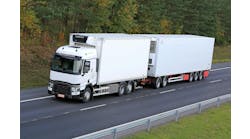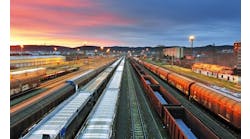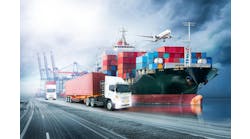Patience may be a virtue, but it's also virtually unknown within the computer industry. Whether they're buying new platforms or needing service on their existing systems, customers don't want it faster - they want it immediately. That need for speed has made expedited shipping a frequently preferred mode for high-tech shippers.
"Accurate, fast shipping for multiple locations is a huge part of our business, and it has to be international," says Sean Murphy, vice president of Canvas Systems, a $220 million provider of refurbished and remanufactured computers. Thanks to its adherence to stringent testing standards, Canvas Systems believes it has achieved a high degree of reliability with its products. "We don't have the 'dead on arrivals' that new equipment has," Murphy says.
In some situations, Canvas Systems will hold inventory at its Atlanta headquarters in advance of customer needs. This may happen if a large company goes bankrupt and the price is right for Canvas Systems, offering some good value for its customers.
Canvas Systems handles the entire high-tech product range, most of it for the business community rather than consumers. An important role the company fills is to act as an independent, non-partisan voice about solutions. Often when one company acquires another, they have two different platforms, each with its own flavor of equipment. In such a case, Canvas Systems acts as an advisor as to which solutions to retain.
Canvas Systems has customers that want it to aggregate everything in Atlanta, put on asset tags, and then distribute it across many countries. To pull that off, Murphy works closely with FedEx on such shipments. The carrier is able to deliver within 24 to 48 hours to all of the 70 countries Canvas Systems does business in.
Just as importantly, FedEx offers supply chain services that go well beyond speed of deliver, Murphy points out. For instance, FedEx consultants offered recommendations on how Canvas Systems could redesign their packaging to ensure their high-tech equipment is not damaged in transit.
According to Murphy, the refurbished equipment prices in North America are the lowest in the world. A number of his global customers often have to establish three different relationships if they're doing business in the U.S., Europe and Asia, which gets to be a headache. "When they deal with us, they have one relationship," he says. "In most instances, we will use North American pricing, and use FedEx to deliver the products to the local market. FedEx clears the shipment and delivers it to their door."
The bottom line, for Murphy, is that the carrier helps fill his final customer's needs. "We see speed, flexibility and customer-centric solutions as important as price or even more so," he notes. "There's just not enough time any more. When somebody says they're looking for cost-effective solutions, what they really mean is they're just looking to maximize time. That's why we've been successful during one of the largest IT recessions and have grown more than 30% a year for the last five years - we respect their time."
As bundled services become increasingly important to shippers, the other major express/expedited carriers are already supplying and enhancing their offerings, with particular emphasis on serving the emerging, robust offshore sourcing segment of the industry — much of that coming from the Asia-Pacific region.
UPS sees the trend of integrating modes of transport continuing to grow, and its Trade Direct services — air, ocean and cross border in North America — serve this market. In 2006, UPS will complete major expansions of its product portfolio with the build-out of its air freight network and expansion of lessthantruckload (LTL) capabilities thanks to its acquisition of Overnite. The company became an NVOCC (non-vessel operating common carrier) ocean carrier some time ago.
In looking at bundled services, Gene Long, president of UPS Consulting, Supply Chain Solutions (SCS), observes, "We look at providing a customer with international transportation — and you can almost put an 'and/or' between every one of these activities — border crossing assistance, whether Customs house brokerage or acting as a forwarding agent, documentation preparation and compliance, hazardous material control, and once you're inside the destination country, distribution services of varying degrees of complexity as well as the transportation to the final customer."
While many SCS customers continue to buy stand-alone services, more often than not, Long's group is responsible for dealing with the development of more complex solutions. The concern is to make the trade experience as repeatable and scaleable as possible. SCS also offers its customers the capability to design the networks they will use.
Long points out that international supply chains are more challenging than domestic because physical spans are longer and there's more risk involved. "They are more complicated because there are more moving parts — more borders, regulations, carriers, and so forth. Another complicating factor is that the consumer has not gotten any more patient, so the urgency to maintain velocity in these long supply chains is as great, if not greater, than when sourcing was all done in the U.S."
During 2005, DHL found its fastest growing product in the U.S. was Import Express with more than 40% growth in volumes, according to Jon Routledge, the company's vice president for international sales. As might be expected, most of that growth was in Asia-Pacific traffic, with U.S. companies sourcing raw materials or finished goods from the region. And as with its competitors, DHL has a variety of business units on which to draw, including Danzas Air and Ocean, DHL Solutions Group and the DHL Express unit.
For international traffic, "there is a requirement to be able to bring goods into the U.S. in a way that is identical to sourcing them from around the U.S.," notes Routledge. "Shippers want the same level of shipment visibility and shipment integrity, and to a certain extent they are looking to us for help with some of the Customs scenarios — to understand the kinds of paperwork that have to be filled out and so forth."
Routledge observes that increasingly, DHL is handling break bulk solutions. It is finding that shippers just want to bring in one shipment and to only have one master invoice for it. Many customers leave it up to DHL to handle Customs duties and the paperwork related to the import. Also, once the cargo has landed and been cleared, customers want it to be moved as a domestic shipment.
DHL offers a warehousing solution for customers, and when required it will move products through the domestic network, either to a shipper's location or to their final customer. DHL can also act as a third-party supplier.
It is becoming increasingly common that the role of a logistics provider in the supply chain to have complete door-todoor control, Routledge notes. "We respect that customers may need us to bring a shipment into the U.S., manage the broker process, then hand it over to another entity to complete the final leg of the journey."
According to Routledge, the industries that have seen the biggest spike in business are apparel, automotive and hightech. The biggest driver for those industries, he notes, is their intense reliance on labor pools to produce materials. The cost of labor in offshore markets is providing significant financial benefits, particularly in those industries.
In terms of market share, DHL is in a catch-up mode with FedEx and UPS but Routledge is bullish on the company's prospects. "In the U.S. we are in the midst of a $1.2 billion investment program in additional facilities and upgrading hubs. We are making significant investment in Asia, particularly in facilities in China and in the Hong Kong hub." The company has also added significant capacity and will continue to invest in infrastructure, technology and additional service offerings.
resourcesCanvas Systems DHL FedEx UPS |


